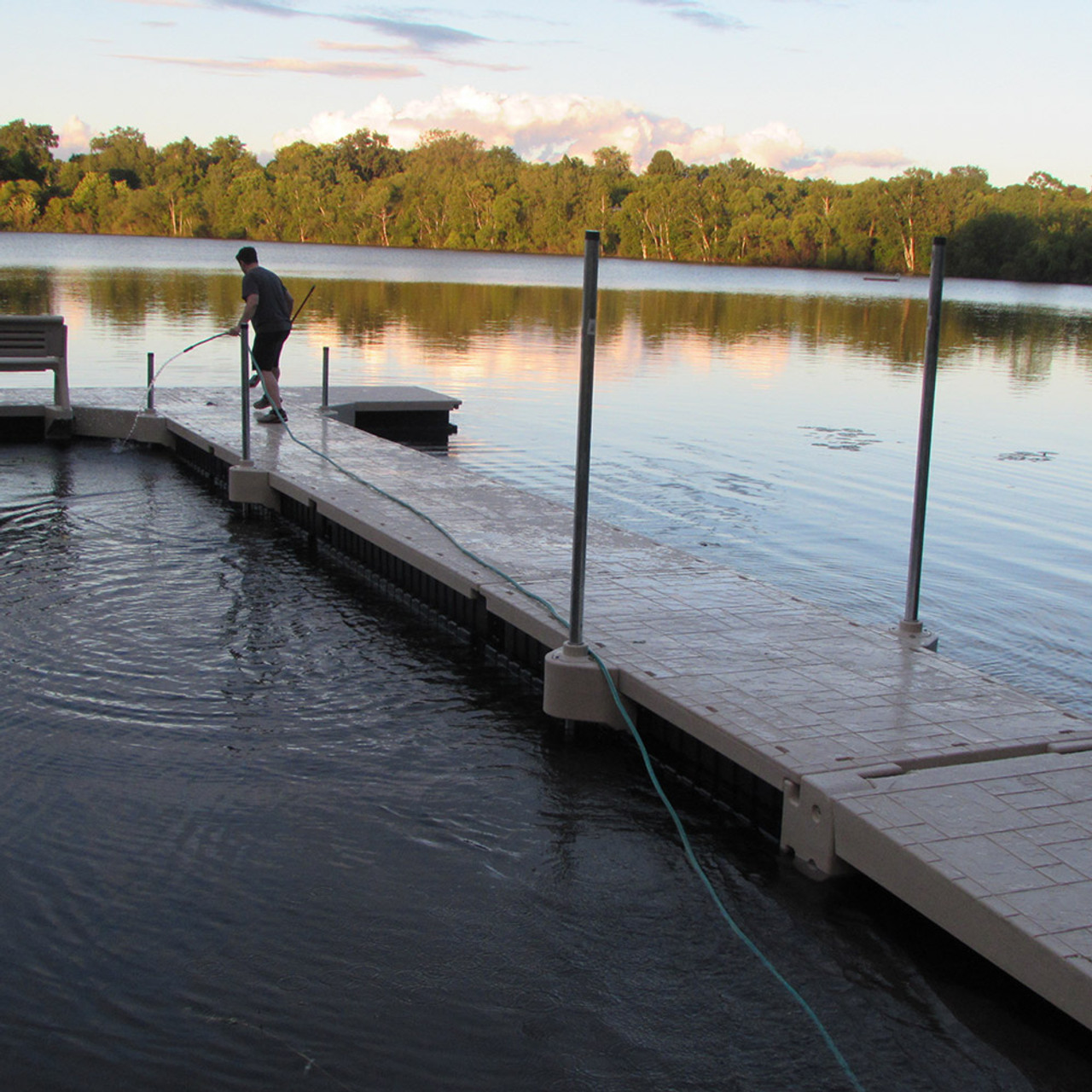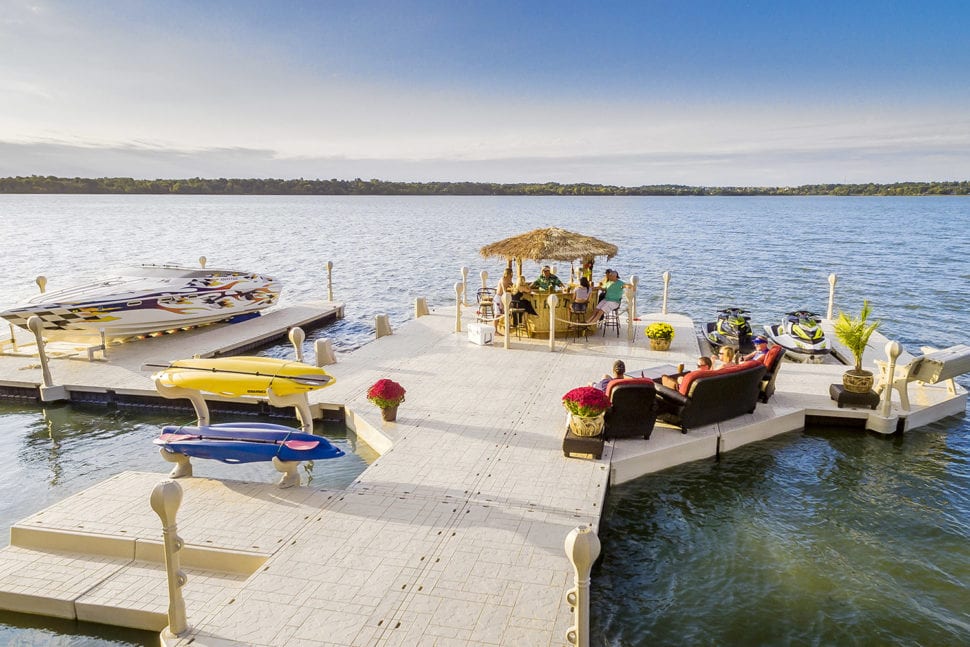Why Floating Docks Are the Perfect Remedy for Your Waterside Demands
Floating docks existing a compelling service for waterfront needs, especially because of their versatility to changing water levels and their durable, modular style. These frameworks not just improve functionality for both recreational and industrial objectives but additionally use customization alternatives customized to details needs. Their eco friendly materials add to sustainability efforts. As we check out the diverse benefits and applications of floating docks, it comes to be obvious why they stand apart in the realm of waterside infrastructure-- particularly when taking into consideration the long-lasting benefits they attend to different stakeholders.
Key Advantages of Floating Docks
The adaptability of floating docks deals many advantages for beachfront applications, making them a progressively preferred choice among marina operators and residential or commercial property developers. One of the primary advantages is their versatility to rising and fall water levels, which allows them to stay practical in different atmospheres, including lakes, rivers, and seaside locations. Unlike traditional fixed docks, floating docks can fall and rise with the tides and seasonal adjustments, guaranteeing constant accessibility.
Furthermore, floating docks are usually less complicated and more economical to preserve and mount. Their modular style promotes quick assembly, lowering labor costs and construction time. Moreover, the materials utilized in floating dock building and construction are usually immune to rust, making certain long life with minimal maintenance.
Safety is another vital advantage; the resilient nature of these docks minimizes the risk of mishaps during disembarking and boarding, making them particularly appealing for family-oriented facilities. Their ecological influence is reduced than that of fixed structures, as they do not disrupt water ecosystems. Collectively, these advantages placement floating docks as an exceptional option for a series of waterside requirements, straightening with both operational efficiency and eco-friendly factors to consider.
Perfect Applications for Various Tasks
Versatility is a trademark of floating docks, making them suitable for a vast array of activities across different waterfront settings. These functional frameworks can work as excellent systems for entertainment tasks such as boating, fishing, and swimming. Their resilient nature permits very easy access to boat, allowing smooth departure and disembarkation, while also providing a steady location for anglers to cast their lines.
In business settings, floating docks promote the loading and discharging of items, fitting both huge and tiny vessels. They are specifically useful in areas with fluctuating water levels, making sure that procedures stay nonstop. In addition, floating docks can be made use of for waterfront dining and amusement, providing a distinct and beautiful experience for patrons.
Ecological applications are also remarkable; floating docks can operate as monitoring systems for wildlife seeing or as docking stations for research study vessels taken part in environmental research studies. As marina developments come to be a lot more prevalent, these docks use a practical option for enhancing capability without comprehensive land modifications. Inevitably, the adaptability of floating docks makes them a recommended selection for anyone looking for efficient and practical beachfront remedies.
Design and Personalization Choices
Floating docks not only satisfy varied activities but also supply a series of design and customization alternatives that enhance their functionality and visual allure. These flexible frameworks can view website be tailored to fit particular waterside needs, whether for household, industrial, or entertainment functions.
One key facet of personalization is the option of materials. Choices vary from high-density polyethylene to light weight aluminum, each offering unique advantages in terms of durability and upkeep. Furthermore, the configuration of the dock can be adjusted to match various water degrees and environmental problems, making sure stability and safety and security.
Layout functions can include integrated seating, railings, and lights, which not only enhance use yet additionally improve the appearance of the dock. Customized shades and surfaces enable owners to match the dock with existing structures or personal preferences, developing a natural search for the waterside.
Moreover, floating docks can be made with modular sections, enabling very easy expansion or reconfiguration as demands change. This versatility is particularly valuable for expanding families or advancing companies. Overall, the substantial layout and customization options available make floating docks a very adaptable option for any kind of waterside setting.
Setup and Maintenance Factors To Consider
Typically, effective setup and maintenance of floating docks require careful planning and interest to information. Before beginning installment, it is crucial to evaluate the particular website problems, including water deepness, wave action, and regional guidelines. This preliminary analysis informs the choice of products and style, ensuring the dock will certainly withstand environmental stress and anxieties.

Maintenance is just as crucial to lengthen the life expectancy of the dock. Regular evaluations should be conducted to recognize wear and tear, particularly on flotation protection devices, adapters, and outdoor decking. Cleaning up the dock periodically aids protect against the build-up of algae and particles, which can endanger surface area integrity and visual appeals.
In addition, seasonal preparations, such as eliminating devices and protecting the dock during severe weather, can prevent damage. By prioritizing appropriate installation and routine maintenance, owners can ensure their floating dock continues to be a dependable and useful beachfront remedy for many years to find.

Ecological Influence and Sustainability
The ecological impact of floating i thought about this docks is an essential factor to consider for waterfront tasks, as these frameworks communicate straight with aquatic environments. floating dock services. Unlike standard fixed docks, floating docks minimize interruption to the substrate, permitting all-natural sediment activity and reducing disintegration. Their design enables for water flow beneath, promoting healthy and balanced marine settings and sustaining local wildlife
Many floating docks are constructed from sustainable products, such as eco-friendly compounds and recycled plastics, which reduce the carbon impact connected with manufacturing. Modern-day designs include attributes that boost ecological sustainability, such as absorptive surface areas that help with water purification and lessen pollution.
Floating docks additionally offer an ideal platform for environment reconstruction by supporting the growth of aquatic vegetation and offering sanctuary for fish and check my source other marine organisms. By including features like fish habitats and immersed plantings, floating docks can improve biodiversity in the area.
Additionally, these frameworks can be developed to suit solar panels, providing renewable resource options that additionally minimize their environmental effect (floating docks). On the whole, floating docks represent a lasting solution that stabilizes human usage of watersides with the preservation of important communities
Conclusion
In verdict, floating docks present a highly versatile and sustainable remedy for diverse waterfront requirements. Their modular design, combined with making use of durable, corrosion-resistant products, guarantees long life and convenience of maintenance. The convenience of floating docks accommodates various applications, ranging from leisure tasks to business operations while lessening environmental effect. Eventually, the personalized functions and ability for development more solidify floating docks as an excellent selection for any type of beachfront project.
Floating docks present an engaging service for waterfront needs, particularly due to their adaptability to rising and fall water degrees and their robust, modular design. Unlike conventional fixed docks, floating docks can increase and fall with the tides and seasonal modifications, making sure constant availability.
Jointly, these benefits position floating docks as a superior solution for a variety of beachfront demands, lining up with both operational efficiency and environmental factors to consider.
On the whole, the considerable design and modification alternatives offered make floating docks a very adaptable option for any waterfront setup.
Unlike standard fixed docks, floating docks reduce disruption to the substratum, allowing for all-natural debris movement and lowering disintegration.